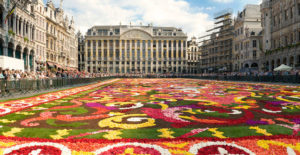
Responding to Injuries and Insults: Good at One. Bad at the Other.
“I once met a man who had forgiven an injury. I hope someday to meet a man who has forgiven an insult.” – Samuel Johnson
I’ve been told that I’m often too forgiving. Too forgiving of employees stealing from me. Or friends lying to me. Or colleagues failing to keep promises.
When, for example, I discovered that a personal assistant had stolen $35,000 from me through fraudulent credit card purchases, I didn’t fire her. We talked about it. She apologized. I forgave her. And we continued to work together (but in a different capacity).
When I discovered that a good friend had been lying to me about circumstances in his life, circumstances that affected my life negatively, I didn’t dissolve our friendship. In this case, we didn’t talk about it, because I believed the lying was not circumstantial. It was an immutable aspect of his personality. I had to ask myself if I could enjoy his friendship going forward. The answer was yes. We are still friends.
When business colleagues (and others) make promises that I know they can’t keep, I encourage them to be realistic. If they insist they can achieve the impossible goal or meet the unrealistic deadline, I make a mental note to forgive them later when they fail. I do it because I believe that when they make the promise, they intend to keep it.
I know that when I’m criticized for being excessively forgiving, it’s meant to protect me from myself. To wake me up to a frailty that could eventually cause me harm. I get that. I appreciate it. But I don’t act on it.
I am not oblivious to the fact that there are people in the world willing to do me harm. I recognize that envy exists – and envy breeds contempt. I know that I am sometimes too direct in my critiques and criticisms – and that, too, can spark embers that flare up later. Most important, perhaps, I have learned that in helping people, we can create in those we help unconscious feelings of resentment.
All those things I accept as common elements of the human condition. But I don’t feel endangered by them. Or vulnerable. I see them for what they are: expressions of hurt. Sometimes warranted, mostly not.
I recognize that I feel immune to them because I am usually operating from a privileged and protected position. And even when I am injured, my reaction is not to strike back. First, because I know that it’s much healthier to forgive than to harbor bitterness. Also, because I recognize that I sometimes injure others.
The bottom line for me is this: I’m comfortable with this “overly” forgiving aspect of my nature.
But there is a kind of injury that I am unable to forgive. As adept as I’ve become at forgiving personal injuries, I cannot bring myself to forgive even the mildest personal insult.
Five things happen when someone insults me:
- I am emotionally hurt by the insult.
- I blame the insulter for my pain.
- I take it personally – i.e., the insult is between him and me.
- I never forget.
- I seek revenge.
Example: Years ago, a well-known novelist and I got into a short public disagreement at a literary conference. I could tell that he was unsettled by the fact that someone from the audience would challenge something he had said. Later, at the cocktail reception, surrounded by his acolytes, he made fun of the tie I was wearing. It was a small slight. I could have, and probably should have, dismissed it. But I didn’t. Because he said it to hurt me. And so, the five steps kicked in. He became my enemy. I wished bad things on him. And I still do.
As I said, I don’t see my response as intelligent. Or useful. I am not justifying it. In fact, in recounting it here, it embarrasses me. But at 71, I’m not likely to change. And to tell the truth, I’m not trying to improve myself in this regard.
I wonder: Am I unusual in feeling this way? Do you forgive injuries? Are you able to forgive insults? Can you, unlike me, forgive both?

